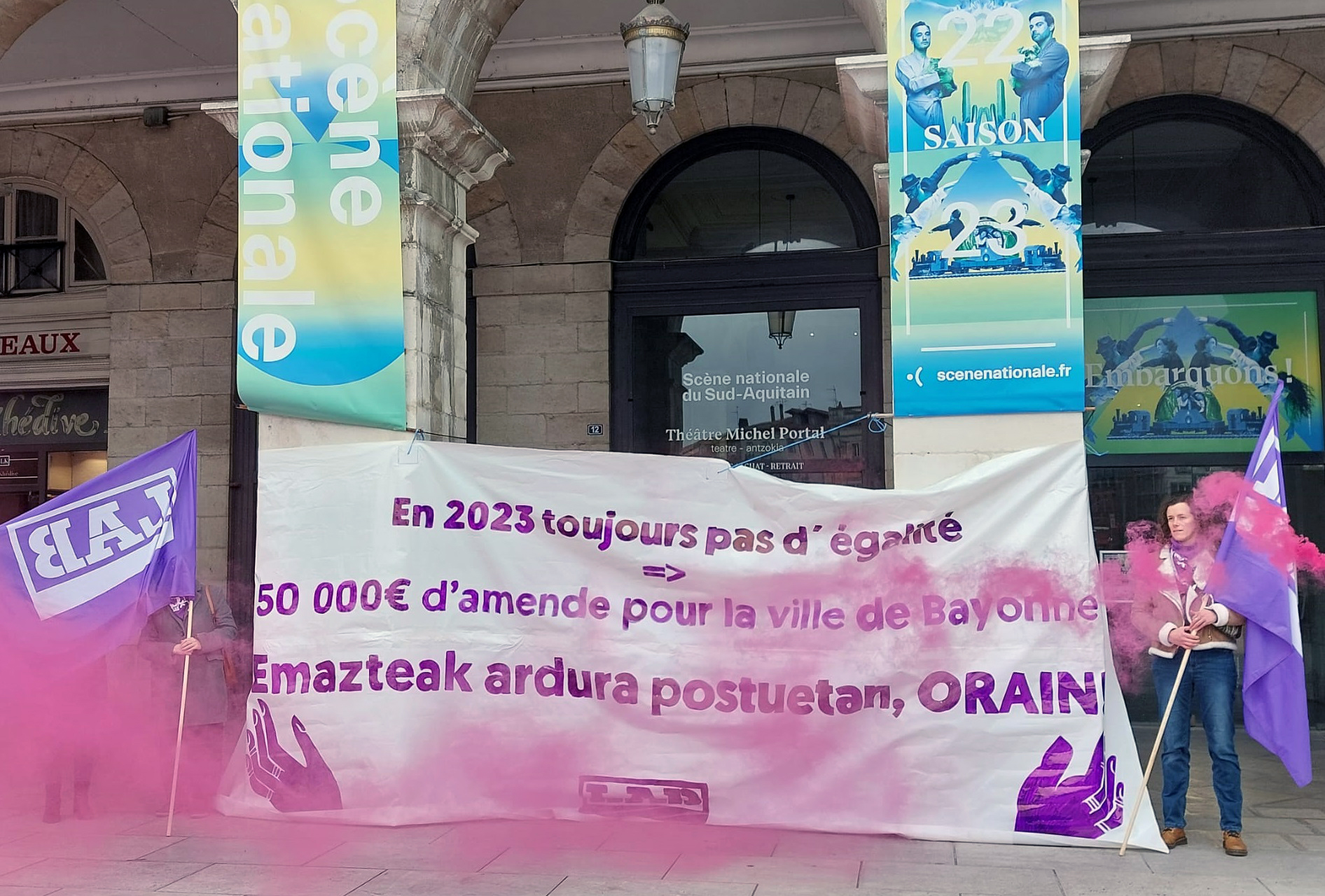The Basque Country that cares (digital?)
We would like to question an issue that in recent months leads us to the plaza since we started writing (or when we started reading). In these strange times in which we live, we should ask ourselves who, why and how he has chosen to appear in the square. Why is there now talk of a reduction in working hours? Furthermore, cuts to the heads of the lines are linked to terrible claims: employment will be destroyed by digitalisation. They bring us the debate about reducing working hours, at the same time, as if the fate of the future were the destruction of jobs (and nothing else) and, as a cocktail ornament, humanized robots or pictures of automotive industrial factories. It looks like one of those strong drinks that can give a lot of good and bad taste.
Listening to words such as the future and employment, we have some representations – frameworks – that are activated involuntarily. These representations are generated (re)endlessly, television, reading, street dialogue, film, data… They go almost unnoticed of the form and content, becoming interiorized and materialized, unintentionally (false)universal, neutral and natural, until we become involved in ourselves. In recent years, the strongest framework built around the future and employment has been digitisation and has been directly linked to the loss of employment and, therefore, to the feeling of fear. As if technological development were inevitable and naturally job losses. Of course that may be the case, but not far from political decisions. Among other things, because, instead of reducing employment, it is also possible to reduce working hours. But we will not confine ourselves to that.
"In recent years, the strongest framework built on the future and employment has been digitisation and has been directly linked to job losses"
Before we are the other, let's look at what we've been given to drink. On the one hand, the question of technological development and digitisation needs to be addressed in a non-absolute and linear manner. On the other hand, and just as feminism has fortunately shown, it is necessary to go to the roots in the perspective on the theme, to discuss all the works. Finally, it would also be necessary and urgent to transform the present into a vision of the future of this country.
Digital development is not a thing of today, but in no case is it a variable that goes through current times and fills them with character. Digitalization has radically changed (and has not changed) our country. Far from linear, not absolute, devotions or curses, it confronts us with a complex reality for those of us who are transforming the parameters of social justice. Digitalization is both a reduction in physical distances and an increase in social distances, it is communication and incommunication, there is precariousness of many jobs (e.g., feminized commercial jobs) and improvement of working conditions (e.g. robots that help heavy movements in care tasks) in the garomento, democratization and the time of moral and ecologically too expensive trips of Jeff Bezos… The list too long. However, it is our responsibility to address this issue from a complex perspective. Always make the political causes of all of them visible. And precisely, to the extent that digitalisation will stifle the majorities in the accumulation of capital wealth, denounce it and, to the same extent, put digitalisation for the benefit of a dignified life and a people.
Nor is it the proposal to cut working hours or a four-day working week. The question of weekly working hours has gained some relative prominence in recent months and, as drops of water, some news, voice or example from all over the world comes to our hands: Sweden, Finland.
We have also wanted to start somewhere and pick up the family thread (or the keyboard of the file finder, if you prefer). We have soon been warned: we are nothing original, here too. Although not many years have passed, in these times when many things happen (regi), the years 1998-1999 were intense to think and discuss the issue of working hours of the week. Herri Batasuna produced a debate report on Human Wage in 1998, which would result in the proposal to distribute Labour in those years. It proposed a 35-hour week (32 hours for the public), a reduction in working hours without wage cuts, of course, the human wage (for those who have no income) and public rental housing. It was a proposal to deal with the high unemployment rates of the time. And the unions also called for the strike.
But we're not at that time, and let's exercise to update it. Working less so that we can all work. The feminist economy, the political theories from the cross between Marxism and feminism, and the debates in the feminist strikes of recent years in Euskal Herria, have revealed the political character of the usual ways of understanding work itself, or at least we have invited it. Indeed, it is an essential exercise of problems if we are to discuss jobs, jobs and distribution.
In short, work is not the same as employment. All jobs are jobs, but not all jobs are jobs today. After all, employment would be that work done in exchange for a salary. And, of that ability of feminism to reformulate work strikes, it has been brought to the plaza that, indeed, works far beyond employment. In addition to this distinction, the debate on the logic of the work was also raised. Necessary and elemental works that, in our capitalist societies, are carried out under the logic of capital accumulation. The two logics are interconnected. In fact, the former are necessary and basic jobs to make social life possible (personal and social), while, in general, they are jobs performed by hidden, private and *unpaid (or marketed in a very precarious way) women. There are, therefore, many jobs that must inevitably be done to make life possible. But, interestingly, they are neither the priority nor the basis in the current system.
"On the one hand, services are privatizing the public and the burden of this work is collapsing on the most precarious sectors. On the other hand, we are an aging people and the need for care is going to be very great in the future"
What's going on in the last few years? Movements are taking place in the ways in which these works were carried out (especially where we need to make life possible). On the one hand, the privatisation of public services and the burden of this work falls on the most precarious sectors. On the other hand, we are an aging people and the need for care is going to be very great in the future. Also, in this system that we are slaves to employment, jobs are being precarious in terms of pay and working hours (endless hours of work and endless availability). Finally, and with particular relevance, women have gone out on a massive scale to the labour market (but men have not been so involved in family work), which has meant unreal days (to the point of not being compatible with employment and other jobs) and care work is marketed, even under more precarious conditions, creating global chains of international surveillance…
With all this in mind, it would not make sense, at least from a transformative perspective, to talk about the destruction of a job and the connection of digitisation whenever we imagine the future. That would be a rather blatant prospect. Or discuss cuts in weekly hours if we are talking exclusively about employment and employment. We need, at least for those of us who are writing these words, to go to the roots and talk about a feminist perspective. To talk about complexity, distribution and recognition of works in no way plural. In other words, distribute the work so that we can all work. Recognize the work (not only in the form of salary, but also) so that we can all build or fight for a dignified life today.
As we have already mentioned, it is essential to think, imagine and act on this issue from a popular perspective. To work on the construction of the present in a different way with a view to the future of this country. Inevitably, we have political imagination and we will need it if we want to stop doing the trick that we are doing. And crises tell us precisely that, that we have no choice but to start building dignified lives, with oneself, with others and with our lands or seas. Rethinking the work: What jobs, what jobs and how will we do them in this people? I mean, what and from where do we want to build our people? We have to look at what we are doing as a people: to realise that our food sovereignty rates are scandalous (we only produce 5%, and how! The Commission's proposal for a directive on the protection of workers from the risks of exposure to the risks of exposure to the risk of exposure to the risk of exposure to the risk of exposure to the risk of exposure to the risk of exposure to the risk of exposure to the risk of exposure to the risk of exposure to the risk of exposure to the risk of exposure to the risk of exposure to the risk of exposure to the risk of exposure to the risk of exposure to the risk. From all this we want to reflect on the manifesto that we have published under the motto Euskal Herria digitala and that we will perform in the days of October. You are invited!
*Idoia Zengotitabengoa and Joseba Permach are members of the Iratzar Foundation
Bidali zure iritzi artikuluak iritzia@argia.eus helbide elektronikora
ARGIAk ez du zertan bat etorri artikuluen edukiarekin. Idatzien gehienezko luzera 4.500 karakterekoa da (espazioak barne). Idazkera aldetik gutxieneko zuzentasun bat beharrezkoa da: batetik, ARGIAk ezin du hartu zuzenketa sakona egiteko lanik; bestetik, egitekotan edukia nahi gabe aldatzeko arriskua dago. ARGIAk azaleko zuzenketak edo moldaketak egingo dizkie artikuluei, behar izanez gero.
Ukrainako gudaren amaierak ondorio sakonak ekarriko ditu Europa osora. Europako elite ekonomikoek beren indar guztia jarri dute guda-zelaian eta galdu egin dute. Galtzaileek, elite globalistek, beren egitasmo kuttuna galduko dute, Europako Batasuna, eta Bruselatik europar... [+]
Azterketak amaitzearekin batera ohikoak bihurtu dira ikasleriaren artean, urteko garai honetan merkeak diren hegaldiak hartu eta adiskideekin bidaiatzea. Horrela egin dut neuk ere eta Londresera joateko aukera izan dut. Ildo beretik, bertan “euskaldun” pilarekin egin... [+]
Ez dakit nondik hasi, egia esan. Ordezkoa naizen heinean –irakaskuntzan ikasturte gutxi batzuk daramatzat lanean– eskola ugari ezagutu ditut Nafarroa, Bizkai eta Araban zehar. Lankide izan ditudan irakasleekin euskal eskolak dituen gabezien inguruan hitz egiten... [+]
Alberto Martinez Eusko Jaurlaritzako Osasun sailburuak argi dio: ez ditu mediku euskaldunak aurkitzen, eta euskarazko osasun arreta ezin da bermatu mediku egoiliar (formazioan dauden espezialista) gehienak kanpotarrak direlako. Mediku euskaldunak bilatzea perretxikotan joatea... [+]
“Gogo eta gorputzaren zilbor-hesteak: bi kate. Bi kate, biak ebaki beharrezkoak: bat gorputzaren bizitzeko, bestea gogoaren askatzeko”. Hala dio Mikel Laboaren kantak; hala izan da belaunaldiz belaunaldi, egun arte.
Gogoan dut nire gurasoak askotan joaten zirela... [+]
Otsailean bost urte bete dira Iruña-Veleiako epaiketatik, baina oraindik hainbat pasarte ezezagunak dira.
11 urteko gurutze-bidea. Arabako Foru Aldundiak (AFA) kereila jarri zuenetik epaiketa burutzera 11 urte luze pasa ziren. Luzatzen den justizia ez dela justizia, dio... [+]
MAITE: (biharko eguna antolatzen bere buruaren baitan) Jaiki, gosaldu, bazkaria prestatu, arropa garbitu, etxea garbitu, gizon hori jaiki, seme-alabak jaiki, hiru horien gosaria prestatu, haiek agurtu, erosketak egin, lanera joan, seme-alabak eskolatik jaso, merienda eman,... [+]
Matxismoa normalizatzen ari da, eskuin muturreko alderdien nahiz sare sozialetako pertsonaien eskutik, ideia matxistak zabaltzen eta egonkortzen ari baitira gizarte osoan. Egoera larria da, eta are larriagoa izan daiteke, ideia zein jarrera matxistei eta erreakzionarioei ateak... [+]
“Kasu, ez gitxu lo!”. Gure denbora eta manerekin baina heldu gira.
Azaroaren 25ean Baionako elgarretaratzera joan ez joan eta autoak nola partekatu pentsatzetik (joan-jina bi oren), bat-batean Lartzabalen elgarretaratze bat antolatu genuen, eta 47 emazte bildu!... [+]
Nahiz eta Nazio Batuen Erakundeak (NBE) 1977an nazioarteko egun bat bezala deklaratu zuen eta haren jatorriaren hipotesi ezberdinak diren, Martxoaren 8aren iturria berez emazte langileen mugimenduari lotua da.
Aurrekoan, ustezko ezkertiar bati entzun nion esaten Euskal Herrian dagoeneko populazioaren %20 atzerritarra zela. Eta horrek euskal nortasuna, hizkuntza eta kultura arriskuan jartzen zituela. Azpimarratzen zuen migrazio masifikatua zela arazoa, masifikazioak zailtzen baitu... [+]
Ez dut beti ulertzen nola aritzen ahal diren lur planeta honetako zati okitu, zuri, gizakoi eta kapitalistako aho zabal mediatikoak, beraiena, hots, gurea, zibilizazioa dela espantuka. Berriak irakurtzen baldin baditugu, alta, aise ohartuko gara, jendetasuna baino, barbaria dela... [+]
Administrazioko hainbat gai, LGTBI+ kolektiboko kideen beharrizanak, segurtasun subjektiboa, klima aldaketa, gentrifikazioa, ikus-entzunezkoak erabiltzeko modu berriak, audientzia-datuak jasotzeko moduak, dislexia, ikuspegi pedagogiko aktibo eta irisgarriak, literatur... [+]
Auzitan jar ez daitekeen baieztapen orokor eta eztabaidaezinaren gisan saldu digute hizkuntzak jakitea printzipioz ona dela, baina baditu bere "ñabardurak", edo esanahi ezkutuagokoak. Hemengo ustezko elebitasun kontzeptuaren azpian dagoen baina kamuflatzen den... [+]
Otzandu egin gara, katalanak eta euskaldunok, ekaitzaren ondoren. Saiatu ginen, bai; sendo ekin genion, eta gogor kolpatu gaituzte; ezin izan genien gure helburu zuzen, ezinbesteko, sakratuei eutsi. Eta porrotaren mingostasuna dastatu dugu, eta bigundu egin gara irabazleen... [+]













